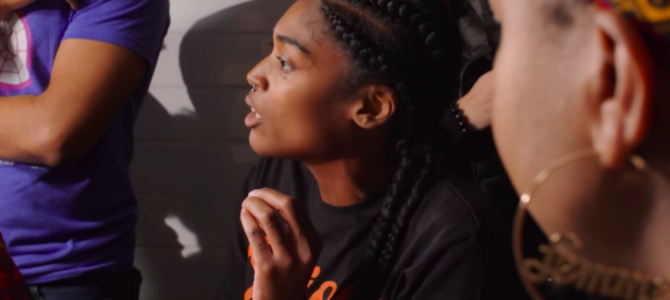
Last week, the Grammy Award-winning Bruno Mars shot to the top of a chart, but probably not for a reason he would like. Mars found himself a top trending topic on Twitter based on an episode of YouTube’s “The Grapevine” dedicated to asking, “Is Bruno Mars a cultural appropriator?”
There are two sub-groups in the video, with the smaller one more intensely obsessed with identity politics than the larger one. The most attention has gone, as one would expect these days, to the most extreme criticisms.
In particular, the attention has gone to panelist Seren Sensei Aishitemasu, who harshly and repeatedly indicts Mars: “Bruno Mars 100 percent is a cultural appropriator. He is racially ambiguous. He is not black, at all, and he plays up his racial ambiguity … to cross genres.”
Aishitemasu also finds him lacking compared to other artists, dismissing him as a “karaoke singer”: “Bruno Mars is not an original artist in the same way that Michael Jackson was an original artist and the same way that Prince was an original artist. What Bruno Mars does, is he takes pre-existing work and he just completely, word-for-word recreates it, extrapolates it.”
She argues that “Prince never won an Album of the Year Grammy … [and] Bruno Mars got that Grammy ’cause white people love him.” Indeed, in her view, Jackson would not be as successful now as he was “and a huge part of that is because people have realized that they prefer their black music and their black culture from a non-black face.”
What’s wrong with this take? Let us count the ways.
At the outset, debates over cultural appropriation are at their silliest when it comes to the subject of American popular music. Rock music is quite famously a mating of Rhythm & Blues to Country & Western. Or, as it was said in the business at the time, a marriage of “race” records and “hillbilly” records.
The cultural appropriation in Rock & Roll – to the extent it could be called that – always ran both ways. For example, Elvis Presley publicly acknowledged his debt to the genius of Fats Domino. But Domino’s best-known recording, “Blueberry Hill,” was written by three white dudes (one an Italian immigrant) and was first recorded as a Country tune by singing cowboy Gene Autry.
The Beach Boys borrowed so much from Chuck Berry that they were forced to give him a writing credit on “Surfin’ U.S.A.,” the music and lyrical conceit of which was lifted from Berry’s “Sweet Little Sixteen.” Conversely, Berry’s seminal “Maybelline” owed a lot to a western swing number, “Ida Red,” that Bob Willis and the Texas Playboys used to play in racially integrated nightclubs. And so it has gone.
Now let’s talk Mars. It is true that his mother is Filipino, while his father is half Puerto Rican and half Ashkenazi Jewish. Given that Puerto Rico and the Philippines are not without populations with African heritage, Mars would probably have to take a genetic test to settle the issue. But the real question is why he would have to in order to satisfy some self-appointed cultural commissars.
The supposed evil of appropriation is the copying of elements of another culture such that their meaning is distorted or lost. But Mars acknowledges and pays tribute to his influences, as he did in this 2017 interview and in his Grammy acceptance speech. Indeed, before this most recent round of controversy, he was just as open in admitting that his 2012 hit, “Locked in a Bottle” was obviously inspired by The Police (a group presumably guilty in turn of culturally appropriating reggae).
Granted, that similarity lends weight to the argument that Mars is not a particularly original artist. The fact that “Uptown Funk” borrows heavily from the sound of 80s-era groups like Morris Day & The Time – and that Mars and others ultimately settled a claim by adding members of the Gap Band as co-writers of the smash – will also follow Mars around.
But the distance between unoriginality and cultural appropriation can be vast. Michael Jackson reportedly confessed to Daryl Hall that “Billie Jean” owed more than a little to the Hall & Oates hit “I Can’t Go for That (No Can Do).” Hall discounted the similarity as much as Sting did when asked about Mars.
It is also fairly bizarre to suggest that Jackson would not be as popular today when his back catalog places him atop the most recent Forbes list of Top-Earning Dead Celebrities at $75 million, perhaps because he spread the message that he was “not going to spend my life being a color” and “it don’t matter if you’re black or white.”
Similarly, on Prince’s Dirty Mind album, the Purple One’s “Uptown” celebrates a place where “White, black, Puerto Rican / Everybody just a-freaking” and “It ain’t about no downtown / Nowhere bound / Narrow-minded drag / It’s all about being free.” It is also fairly obvious that Prince was inspired by integrated bands like the Jimi Hendrix Experience and Sly & The Family Stone.
Granted, Prince never won the Grammy for Album of the Year. But that says more about the Grammys’ long and storied tradition of bad decision-making than it is about a taste for cultural appropriation.
The Recording Academy once awarded Best Hard Rock / Heavy Metal Recording to Jethro Tull over Metallica. And it awarded Best New Artist to A Taste of Honey (known for the immortal “Boogie Oogie Oogie”) over Elvis Costello or The Cars – and failed to even nominate Chic! If they preferred their black music from a non-black face, they might have given a Grammy to Led Zeppelin during that band’s working career, but they did not.
The reality is that both Michael Jackson and Prince received numerous nominations and awards from various organizations during their peak years and beyond. Prince even received an Oscar – even though that crowd is often plagued by the same old-fogeyism as the Grammys. Moreover, Prince arguably got more recognition from the Grammys than from the Soul Train Awards.
All of which is to say that the historical illiteracy displayed by critics of Mars is probably necessary for the charge of cultural appropriation to be taken even half-seriously. And that nothing is quite so sad and ridiculous as a panel of young people who may have convinced themselves that the racial climate in America is worse now than it was when Michael Jackson and Prince were carving out their careers.
Or perhaps worse, the ostentatious outrage may be a performance in itself, calculated to gain some marginal political advantage in America’s now seemingly endless cultural disputes. As such, Mars’s harshest critics are themselves appropriating the philosophies and tactics of narrow-minded puritans and totalitarians, which span nations and centuries. That’s the problem with appropriation; it’s unavoidable.









